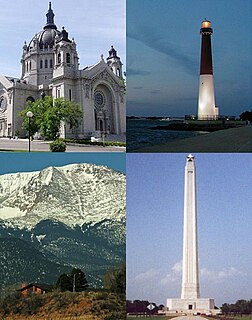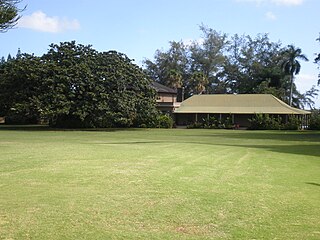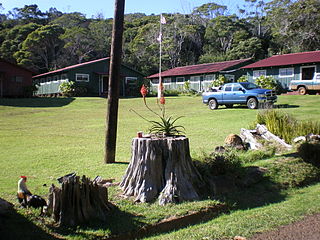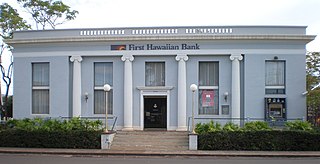The National Register of Historic Places (NRHP) is the United States federal government's official list of districts, sites, buildings, structures and objects deemed worthy of preservation for their historical significance. A property listed in the National Register, or located within a National Register Historic District, may qualify for tax incentives derived from the total value of expenses incurred in preserving the property.

This is a list of properties and historic districts in Hawaii listed on the National Register of Historic Places. More than 340 listings appear on all but one of Hawaii's main islands and the Northwestern Islands, and in all of its five counties. Included are houses, schools, archeological sites, ships, shipwrecks and various other types of listings. These properties and districts are listed by island, beginning at the northwestern end of the chain.

The U.S. National Register of Historic Places (NRHP) classifies its listings by various types of properties. Listed properties generally fall into one of five categories, though there are special considerations for other types of properties which do not fit into these five broad categories or fit into more specialized subcategories. The five general categories for NRHP properties are: building, district, object, site, and structure.

Grand Canyon Village Historic District comprises the historic center of Grand Canyon Village, on the South Rim of the Grand Canyon in Grand Canyon National Park, Arizona. The district includes numerous landmark park structures, many of which are National Historic Landmarks themselves, or are listed on the National Register of Historic Places. The town design as a whole is also significant for its attention to integration with the Grand Canyon landscape, its incorporation of National Park Service Rustic design elements, and for the idiosyncratic design of park concessioner structures such as the El Tovar Hotel.
This is a list of properties and districts in Bibb County, Georgia that are listed on the National Register of Historic Places (NRHP).

The Hawaii Capital Historic District in Honolulu, Hawaii, has been the center of government of Hawaii since 1845.

The YWCA Building at 1040 Richards Street, Honolulu, Hawaii, popularly called the Richards Street Y, is now officially named Laniākea, which means 'open skies' or 'wide horizons' in the Hawaiian language. It was designed by San Francisco architect Julia Morgan, who considered it one of her favorites. The building consists of two large units which are connected by a two-story loggia. The main building is three stories high and faces Richards St. with a frontage of 165 feet. The second unit, which is directly in the rear of the first, is somewhat smaller, being two stories high with a large basement.

Grove Farm is a historic agricultural site on Kauai in the Hawaiian Islands.

The Albert Spencer Wilcox Building is a historic building in Līhuʻe, Kauaʻi, Hawaii. Originally a library when it opened in 1924, it was later converted into the Kauaʻi Museum. It has exhibits on the history of the island of Kauaʻi. It was added to both the Hawaiʻi Register of Historic Places and the National Register of Historic Places in 1979.

The Albert Spencer Wilcox Beach House was a home of Albert Spencer Wilcox. Located on Weke Road in Hanalei, Hawaii, it was listed on the Hawaiʻi Register of Historic Places in 1987 and on the National Register of Historic Places in 1993. It is a Folk Victorian-style building, with roofed lānai connecting the rooms. A 22-acre (8.9 ha) property, including five contributing buildings and four other contributing structures, was listed.

Civilian Conservation Corps Camp in Kokeʻe State Park is located at Hawaii Route 550, in Waimea, on the island of Kauai, in the U.S. state of Hawaii. It was built in 1935 with lumber that was put into the saltwater and floated to the shore at Port Allen, the seawater adding a natural termite protection to the lumber. The camp was in continual use for forest management, until Hurricane Iwa devastated it in 1982. In the 1990s it was restored through the efforts of the non-profit Hui O Laka environmental group, and is currently open to the public. It was added to the Hawaiʻi Register of Historic Places and the National Register of Historic Places on December 20, 1996.

The Mawavi Historic District, Chopawamsic RDA Camp 2 near Triangle, Virginia, United States, dates from 1942. It was listed on the National Register of Historic Places in 1989.

The Bishop National Bank of Hawaii was a bank in Hawaii. Its branch building on Hawaii Route 50 in Waimea, Kauai, Hawaii, was built in 1929. That branch building has also been known as First Hawaiian Bank, as Bishop National Bank, Waimea Branch, and as Bishop First National Bank, Waimea Branch. The building includes Classical Revival architecture and was a work of architect John Mason and of J.L. Young Engineering Co. The building was listed on the Hawaiʻi Register of Historic Places in 1977 and on the National Register of Historic Places (NRHP) in 1978.
The Charles Gay House, on Gay Road in Waimea, Kauai, Hawaii, was built in 1895. It has also been known as the Roland Gay Residence. It was listed on the Hawaiʻi Register of Historic Places and the National Register of Historic Places (NRHP) in 1984; the NRHP listing included three contributing buildings.

The Lihue Civic Center Historic District, in Lihue, Kauai, Hawaii, is a 5-acre (2.0 ha) historic district that was listed on the National Register of Historic Places in 1981. It includes Classical Revival and Mission/spanish Revival architecture in structures dating back as far as 1913. The Kauai County Courthouse, the County Building (1913), and the County Building Annex are the three contributing buildings in the district, and its one contributing site is a park; all are within one city block in the center of downtown Lihue.

The Menehune Fishpond, near Līhuʻe, Hawai`i, on the island of Kaua`i, is a historic Hawaiian fishpond. Also known as Alakoko Fishpond, it has been listed on the U.S. National Register of Historic Places.

Kilauea Elementary School, also known as Kilauea School, on Kolo Rd. in Kilauea, Hawaii, on Kauai, is a public elementary school operated by the Hawaii Department of Education. It occupies a historic school building that was founded in 1882 and known as an "English School". The current school complex, whose main building was built in 1922, was listed on the National Register of Historic Places in 1983; the listing included three contributing buildings on 6.5 acres (2.6 ha).
The Kilauea Plantation or Kilauea Sugar Plantation was a large sugarcane plantation on the north side of Kauai island, Hawaii, including the community of Kilauea, Hawaii. It was owned and operated by the 1880-incorporated Kilauea Sugar Company, which became the Kilauea Sugar Plantation, Co. from 1899 on. The original property was bought by an American, Charles Titcomb, from Kamehameha IV by 1863 who used it for cattle ranching. It was sold to Englishmen John Ross and E.P. Adams, who also leased additional land from Titcomb. Ross and Adams planted sugarcane, then incorporated a firm. It was operated as a plantation from 1880 to 1971.
The Haena Archeological Complex, on Kauai near Hanalei, Hawaii, is an archeological site complex that is listed on the U.S. National Register of Historic Places.
















